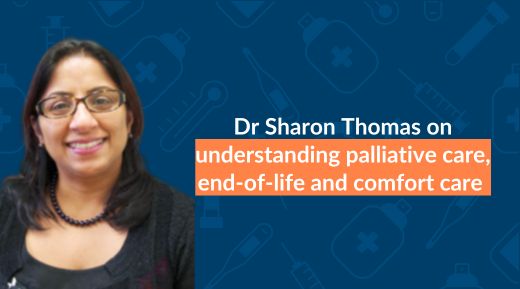



To receive important alerts and updates from Gold Coast Primary Health Network, please submit the form below.
"*" indicates required fields

To receive important alerts and updates from Gold Coast Primary Health Network, please submit the form below.

Palliative care is an essential component of healthcare that aims to improve the quality of life for patients dealing with serious, chronic, or life-threatening illnesses. Unlike treatments that aim to cure the disease, palliative care focuses on relieving symptoms and providing holistic support, physical, emotional, and spiritual, regardless of the stage of the illness. It can be provided alongside curative treatments and is not confined to the final stages of life.
Research emphasises the importance of early initiation of palliative care. Gaertner et al. (2019) highlight that introducing palliative care early in the disease process leads to improved symptom management, better quality of life, and enhanced communication between patients, families, and healthcare providers. Early involvement also helps patients make informed decisions and avoid unnecessary aggressive treatments, which may not align with their values or preferences.
Timely referral to palliative care services is equally critical. As Ferrell et al. (2017) note, delays in referral are often due to misconceptions and the stigma that palliative care is synonymous with giving up. To counter this, the authors recommend identifying specific triggers such as frequent hospitalisations, functional decline, or poor prognosis, that can guide timely referral. They also stress the need for referral guidelines and interdisciplinary collaboration to optimise patient outcomes. Fortunately for the Gold Coast, both these measures are in place with easy access to the Palliative Care team, and Health Pathway guidelines.
In addition to medical interventions, non-pharmacological approaches play a significant role in palliative care. According to Bergqvist et al. (2022), interventions such as music therapy, massage, aromatherapy, touch therapy, and guided imagery have shown to reduce pain, anxiety, and distress. These methods contribute to emotional and spiritual well-being and complement pharmacological treatments by creating a more comforting environment. However, the study also calls for more structured implementation and further research to standardise these practices.
It is essential to distinguish between palliative care, end-of-life care, and comfort care. Palliative care is a comprehensive, long-term support system that can be offered at any stage of a serious illness. End-of-life care is a subset of palliative care that focuses on the final weeks or months of life, emphasising dignity, comfort, and emotional support. Comfort care, often used interchangeably with end-of-life care, specifically refers to symptom relief when curative treatments are no longer pursued.
Understanding these distinctions ensures that patients receive appropriate care aligned with their needs and values. Integrating palliative care early, referring patients in a timely manner, and using a blend of pharmacological and non-pharmacological interventions are key strategies in improving patient experiences and outcomes.
Bergqvist, J., Strang, P., & Orrevall, Y. (2022). Use of non-pharmacological interventions for comforting patients in palliative care: A scoping review. BMC Palliative Care, 21(1), 1–13. https://doi.org/10.1186/s12904-022-00913-z
Gaertner, J., Siemens, W., Meerpohl, J. J., & Antes, G. (2019). Early palliative care for adults with advanced cancer. Cochrane Database of Systematic Reviews, 2019(6). https://doi.org/10.1002/14651858.CD011129.pub2
Ferrell, B. R., Temel, J. S., Temin, S., Alesi, E. R., Balboni, T. A., Basch, E. M., … & Smith, T. J. (2017). Integration of palliative care into standard oncology care: American Society of Clinical Oncology clinical practice guideline update. Journal of Clinical Oncology, 35(1), 96–112. https://doi.org/10.1200/JCO.2016.70.1474
Written by Dr Sharon Thomas
So we can provide you with the most accurate information,
please tell us a little more about yourself

